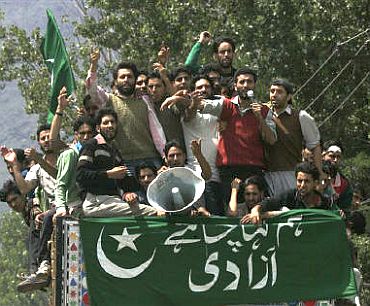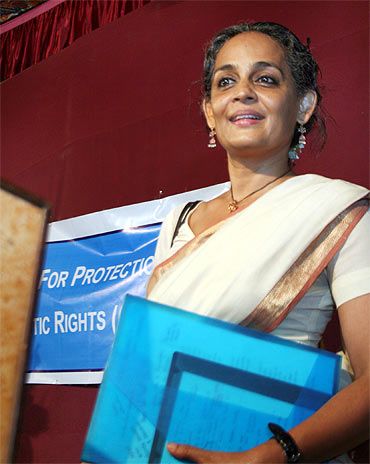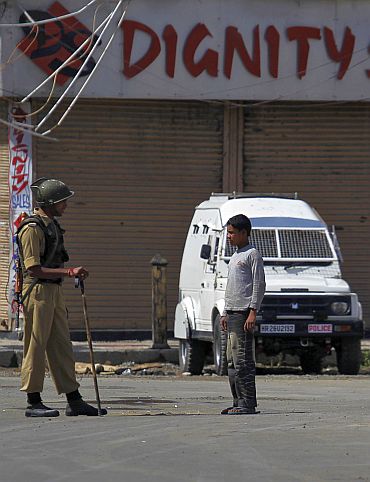Photographs: Reuters
B Raman feels that acting against Roy would add to the difficulties already being faced by us in dealing with the situation in Jammu and Kashmir.
Has Arundhati Roy, the well-known writer and social activist, committed the offence of sedition against the Indian State by her recent speeches and statements, which have expressed sympathy and understanding for the separatist movement in Jammu and Kashmir?
It is a fact that there is disaffection against the Indian State in some sections of the Muslim population of Jammu and Kashmir for nearly four decades.
It is this disaffection that led to the hijacking of an Indian Airlines plane to Lahore in 1971, to the kidnapping and murder of an Indian diplomat in Birmingham UK in 1983 and to many acts of terrorism in J &K since 1989 -- directed against the security forces as well as innocent civilians.
...
Roy is not the originator or instigator of the acts of sedition
The indigenous separatist groups in J&K indulged in not only sedition and terrorism against the Indian State, but also treason by seeking the help of Pakistan's Inter-Services Intelligence for their movement involving sedition and terrorism.
Wikipedia says as follows on sedition and treason: "Sedition is the stirring up of rebellion against the government in power. Treason is the violation of allegiance to one's sovereign or state, giving aid to enemies, or levying war against one's state. Sedition is encouraging one's fellow citizens to rebel against their state, whereas treason is actually betraying one's country by aiding and abetting another state."
She is not an active participant in the movement
What Roy has done is to take note of the disaffection against the Indian State in Jammu and Kashmir, draw the attention of the rest of India to the disaffection, analyse the causes for the disaffection such as alleged human rights violations and express her understanding and sympathy for those in J&K who have taken to arms against the Indian State.
The case against her from the point of view of sedition is a difficult one to decide. She is not one of the originators of the separatist movement. She is not an active participant in the movement.
At the same time, by expressing her sympathy and understanding of the movement and its objective of freedom she has given moral support to the movement.
Should a person, who extends moral support to a movement involving sedition, treason and terrorism, be treated as an active participant or at least instigator of the movement and arrested and prosecuted under the laws relating to sedition?
We should avoid ham-handed action
It needs to be underlined that she has not tried to cause or spread disaffection against the State among the non-Kashmiri segments of the Indian population unless one treats her support to the Maoists as amounting to causing disaffection against the State among the tribals.
Should someone, who takes cognisance of the movement in Jammu and Kashmir without having been one of the organisers of it and calls for action to address the causes of the movement, be treated on par with someone who is among the dramatis personae of the movement?
Her campaign against the State, however provocative, should be handled through counter-arguments that would carry conviction to public opinion in Jammu and Kashmir and outside and not by arresting and prosecuting her. We should avoid ham-handed action.





article